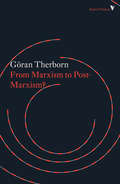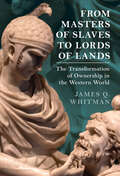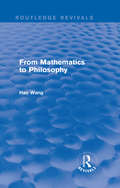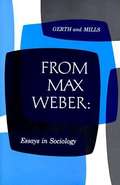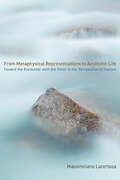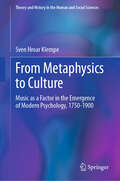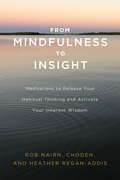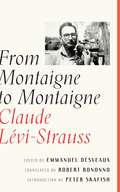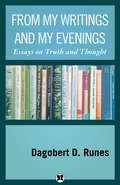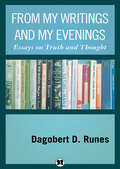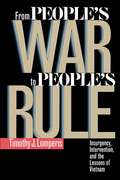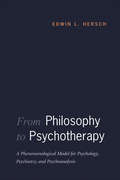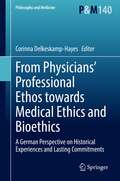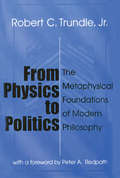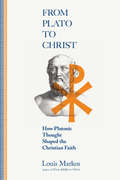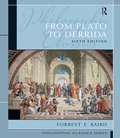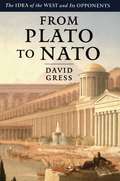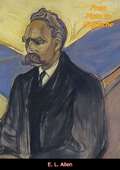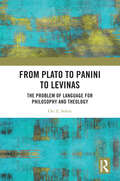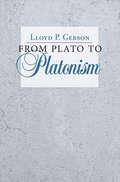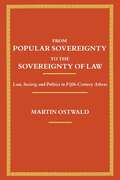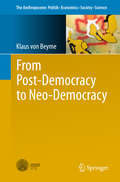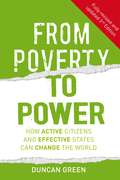- Table View
- List View
From Marxism to Post-Marxism? (Radical Thinkers)
by Goran TherbornA comprehensive history of the development of Marxist theory and the parameters of 21st-century politicsIn this pithy and panoramic work—both stimulating for the specialist and the accessible to the general reader—one of the world's leading social theorists, Göran Therborn, traces the trajectory of Marxism in the twentieth century and anticipates its legacy for radical thought in the twenty-first.
From Masters of Slaves to Lords of Lands: The Transformation of Ownership in the Western World (Studies in Legal History)
by James Q. WhitmanToday we think of land as the paradigmatic example of property, while in the past, the paradigmatic example was often a slave. In this seminal work, James Q. Whitman asserts that there is no natural form of ownership. Whitman dives deep into the long Western history of this transformation in the legal imagination – the transformation from the ownership of humans and other living creatures to the ownership of land. This change extended over many centuries, coming to fruition only on the threshold of the modern era. It brought with it profound changes, not only in the way we understand ownership but also in the way we understand the state. Its most dramatic consequence arrived in the nineteenth century, with the final disappearance of the lawful private ownership of humans, which had been taken for granted for thousands of years.
From Mathematics to Philosophy (Routledge Revivals)
by Hao WangFirst published in 1974. Despite the tendency of contemporary analytic philosophy to put logic and mathematics at a central position, the author argues it failed to appreciate or account for their rich content. Through discussions of such mathematical concepts as number, the continuum, set, proof and mechanical procedure, the author provides an introduction to the philosophy of mathematics and an internal criticism of the then current academic philosophy. The material presented is also an illustration of a new, more general method of approach called substantial factualism which the author asserts allows for the development of a more comprehensive philosophical position by not trivialising or distorting substantial facts of human knowledge.
From Max Weber: Essays in Sociology
by Max Weber C. Wright Mills Hans H. GerthAn introduction to the work of the greatest German sociologist and a key figure in the development of present-day sociological thought.
From Metaphysical Representations to Aesthetic Life: Toward the Encounter with the Other in the Perspective of Daoism (SUNY series in Chinese Philosophy and Culture)
by Massimiliano LacertosaWhat is "Chinese philosophy?" What is "philosophy" itself? How can one understand unfamiliar philosophical stances? How can comparison become a prominent philosophical tool? In this book, Massimiliano Lacertosa examines these questions by proposing an ethical understanding of the aesthetic encounter with the other and the world. Through the analysis of the works of Laozi, Zhuangzi, Nietzsche, and Heidegger, among others, this book explores the possibilities of stepping out of the anthropocentric standpoint and seeing the relation of objects in the world under a different light. This implies a shift from the metaphysical representation of the world divided between the sensible and the supersensible to an aesthetic and undivided experience of the world in which one partakes in the constant transformation of the myriad things. Approachable yet rigorous, this book is essential reading for anyone interested in the most fundamental issues of philosophy and in the challenges of doing philosophy in a multicultural context.
From Metaphysics to Culture: Music as a Factor in the Emergence of Modern Psychology, 1750-1900 (Theory and History in the Human and Social Sciences)
by Sven Hroar KlempeThis book is a follow-up to the book Tracing the Emergence of Psychology, 1520-1750: A Sophisticated Intruder to Philosophy (Springer 2020). In contrast, this new book covers the period 1750-1900. Whereas the previous book focused on how psychology intervened in philosophy and theology, the perspective now is how philosophy and psychology tried to free themselves from each other. Kant&’s critical project formed an important start on this. Nevertheless, this was a struggle during the whole period, with a culmination at the end of the 19th century. When experimental psychology was established in Leipzig, psychology became regarded as an independent science. Another aspect of this new project is to pursue how experimental psychology ended up with music and culture as important factors. These are highly related to the role of sensation in psychology, which influenced how Baumgarten turned the psychological project into aesthetics in 1750. Thus, psychology in dialogue with music and aesthetics forms the red thread in this book. This book targets all interested in the history of psychology.
From Mindfulness to Insight: Meditations to Release Your Habitual Thinking and Activate Your Inherent Wisdom
by Choden Rob Nairn Heather Regan-AddisBuilding on mindfulness and self-compassion practices, this step-by-step guide to secular insight meditation shows the way to freedom from deeply rooted thought patterns.Discover joy within yourself and heartfelt connection with others by releasing the habitual thought patterns that cause suffering and alienation. Drawing on Buddhist wisdom as well as the latest research in psychology and neuroscience, this book provides you with the tools needed to recognize the habits of thinking that fuel anger, desire, jealousy, and pride. Building on mindfulness and self-compassion practice, it offers a step-by-step series of guided meditations that create the conditions for liberating insight and wisdom to naturally arise. Thousands of people in the last decade have benefited from practicing the exercises in this book, which were developed and taught as part of the curriculum at the Mindfulness Association, an organization founded to deliver training in mindfulness, compassion, and insight.
From Models to Simulations (History and Philosophy of Technoscience)
by Franck VarenneThis book analyses the impact computerization has had on contemporary science and explains the origins, technical nature and epistemological consequences of the current decisive interplay between technology and science: an intertwining of formalism, computation, data acquisition, data and visualization and how these factors have led to the spread of simulation models since the 1950s. Using historical, comparative and interpretative case studies from a range of disciplines, with a particular emphasis on the case of plant studies, the author shows how and why computers, data treatment devices and programming languages have occasioned a gradual but irresistible and massive shift from mathematical models to computer simulations.
From Montaigne to Montaigne
by Claude Lévi-StraussTwo previously unpublished lectures charting the renowned anthropologist&’s intellectual engagement with the sixteenth-century French essayist Michel de Montaigne In January 1937, between the two ethnographic trips he would describe in Tristes Tropiques, Claude Lévi-Strauss gave a talk to the Confédération générale du travail in Paris. Only recently discovered in the archives of the Bibliothèque national de France, this lecture, &“Ethnography: The Revolutionary Science,&” discussed the French essayist Michel de Montaigne, to whom Lévi-Strauss would return in remarks delivered more than a half-century later, in the spring of 1992. Bracketing the career of one of the most celebrated anthropologists of the twentieth century, these two talks reveal how Lévi-Strauss&’s ethnography begins and ends with Montaigne—and how his reading of his intellectual forebear and his understanding of anthropology evolve along the way.Published here for the first time, these lectures offer new insight into the development of ethnography and the thinking of one of its most important practitioners. Essays by Emmanuel Désveaux, who edited the original French volume De Montaigne à Montaigne, and Peter Skafish expand the context of Lévi-Strauss&’s talks with contemporary perspectives and commentary.
From Morality To Mental Health: Virtue And Vice In A Therapeutic Culture (Practical And Professional Ethics Ser.)
by Mike W. MartinMorality and mental health are now inseparably linked in our view of character. Alcoholics are sick, yet they are punished for drunk driving. Drug addicts are criminals, but their punishment can be court ordered therapy. The line between character flaws and personality disorders has become fuzzy, with even the seven deadly sins seen as mental disorders. In addition to pathologizing wrong-doing, we also psychologize virtue; self-respect becomes self-esteem, integrity becomes psychological integration, and responsibility becomes maturity. Moral advice is now sought primarily from psychologists and therapists rather than philosophers or theologians.
From My Writings and My Evenings
by Dagobert D. RunesIt is late in the evening and a philosopher wants to get words on paper. No grand project. No grand system of thought, just an attempt to get some things off his chest. Where would he turn his attention? Where would his thoughts lead him? Several catch phrases become crystallization points for his thoughts: thinking, the nature of man, the art of living, God and religion, Jews and anti-Semitism, crime and punishment, education, arts and science, language and literature, history and the state. Dagobert D. Runes put in much effort to avoid the pursuit of false ideas. In fact, the preface to From My Writings and My Evenings reads: "Hesitancy in judgment is the true mark of the thinker. Men think quite alike as they desire alike; if they were different, they could not co-exist even for a day. But most people judge by traditional or imitated judgment patterns, and snap judgments are the rule and the rulers." How is one to avoid the pitfalls apparent in such judgments, and still contribute to one's personal philosophy? If you are hesitant in your judgments, then what can you state that you believe to be unquestionably true? The result is a touching document of a philosopher who investigates many areas of man's endeavors, and who seeks to characterize what he judges to be the pure, true nature of these realms.
From My Writings and My Evenings: Essays on Thoughts and Truth
by Dagobert D. RunesA scholar embarks on a journey into the philosophical issues that concern him most in this profound and deeply personal essay collection. It is late in the evening and a philosopher wants to get words on paper. No grand project or treatise, just an attempt to get some things off his chest. Certain phrases become touchstones for his thoughts: the nature of man, the art of living, God and religion, Jews and anti-Semitism, crime and punishment, arts and science, language and literature, history and the state, education, and thinking itself. Believing that hesitancy in judgment is the true mark of the thinker, Dagobert D. Runes interrogates each of these themes as he wrestles with the question: If you hesitate in your judgments, how can you arrive at certainty? The result is a touching document of a philosopher who investigates many areas of man&’s endeavors, and who seeks to characterize what he judges to be the pure, true nature of these realms.
From People’s War to People’s Rule
by Timothy J. LomperisTimothy Lomperis persuasively argues the ironic point that the lessons of American involvement in Vietnam are not to be found in any analysis of the war by itself. Rather, he proposes a comparison of the Vietnam experience with seven other cases of Western intervention in communist insurgencies during the Cold War era: China, Indochina, Greece, the Philippines, Malaya, Cambodia, and Laos. Lomperis maintains that popular insurgencies are manifestations of crises in political legitimacy, which occur as a result of the societal stresses caused by modernization. Therefore, he argues, any intervention in a 'people's war' will succeed or fail depending on how it affects this crisis. The unifying theme in the cases Lomperis discusses is the power of land reform and electoral democracy to cement political legitimacy and therefore deflect revolutionary movements. Applying this theory to the ongoing Sendero Luminoso insurgency in Peru, Lomperis makes a qualified prediction of that conflict's outcome. He concludes that a global trend toward democratization has produced a new era of 'people's rule.'
From Philosophy to Psychotherapy: A Phenomenological Model for Psychology, Psychiatry, and Psychoanalysis
by Edwin L. HerschPresenting a highly innovative exploration of the relationship between philosophical and psychological issues, Edwin L. Hersch argues that psychological theories and practices inescapably rest upon a series of philosophical positions – whether they are acknowledged and reflected upon or not. To examine this proposition Hersch develops his Hierarchy of Levels of Theoretical or Philosophical Inquiry Method, which involves the systematic consideration of a series of philosophical questions pertaining to the ontological, general epistemological, field-specific epistemological, and psychological stances adopted (either explicitly or implicitly) by any particular psychological theory. By using this hierarchical framework the book then attempts to develop a new approach to psychological theory and psychotherapeutic practice based largely on the premises of phenomenological philosophy. The scope of the book cuts across a variety of theoretical and professional disciplinary approaches within the broad psychological field in demonstrating the relevance of certain philosophical issues for all of them. Clinicians, theorists and students in the psychological field are presented with a palatable introduction to the importance and inevitability of dealing with philosophy in pursuing their own work. Furthermore, his philosophical explications of a variety of psychological theories provide a new tool with which to better understand, compare, or assess any internal inconsistencies.
From Physicians’ Professional Ethos towards Medical Ethics and Bioethics: A German Perspective on Historical Experiences and Lasting Commitments (Philosophy and Medicine #140)
by Corinna Delkeskamp-HayesThis book assembles essays by thinkers who were at the center of the German post World War II development of ethical thought in medicine. It records their strategies for overcoming initial resistance among physicians and philosophers and (in the East) politicians. This work traces their different approaches, such as socialist versus liberal bioethics; illustrates their attempt to introduce a culture of dialogue in medicine; and examines their moral ambiguities inherent to the institutionalization of bioethics and in law. Furthermore, the essays in this work pay special attention to the problem of ethics expertise in the context of a pluralism, which the intellectual mainstream of the country seeks to reduce to “varieties of post-traditionalism". Finally, this book addresses the problem of “patient autonomy”,and highlights the difficulty of harmonizing commitment to professional integrity with the project of enhancing physician’s responsiveness to suffering patients. As these essays illustrate, the development of bioethics in Germany does not follow a linear line of progressiveness, but rather retains a sense of the traditional ethos of the guild. An ethos, however, that is challenged by moral pluralism in such a way that, even today, still requires adequate solutions. A must read for all academics interested in the origins and the development of bioethics.
From Physics to Politics: The Metaphysical Foundations of Modern Philosophy
by Robert TrundleMass ideology is unique to modern society and rooted in early modern philosophy. Traditionally, knowledge had been viewed as resting on metaphysics. Rejecting metaphysical truth evoked questions about the source of -truth.- For nineteenth-century ideologists, -truth- comes either from dominating classes in a progressively determined history or from a post-Copernican freedom of the superior man to create it. In From Physics to Politics Robert C. Trundle, Jr. uncovers the relation of modern philosophy to political ideology. And in rooting truth in human nature and Nature by modal reasoning, he resolves the problem of politicized truth. Our concepts of scientific truth, logic, and necessity are essentially connected. Modern philosophy restricts our understanding of necessity to the political dreams and aspirations of Enlightenment intellectuals. As a result, these intellectuals refuse to acknowledge as factual or meaningful whatever is not intelligible within the practical goals of establishing science as a system of enlightened ideas. The effect of these ideas is that in our time metaphysical principles, speculative truths, our understanding of science, and the nature of logic have become subordinated to ideological dreams. Fascism, Nazism, Marxism, political correctness, and moral relativism are not historical aberrations but essential consequences. Trundle's work is groundbreaking and daring, and his underlying thesis demonstrates why scientific truth demands a modal defense. The defense not only integrates science, ethics, and politics, but shows how -truth- may be ascribed to moral and scientific principles in contrast to a modern philosophical tradition. Since this tradition is the origin of political ideology, it has led to an irrational politicization of truth. The book will appeal particularly to those interested in political history, histories of philosophy, the philosophy of sciences, and ethics.
From Plato to Christ: How Platonic Thought Shaped the Christian Faith
by Louis MarkosWhat does Plato have to do with the Christian faith? Quite a bit, it turns out. In ways that might surprise us, Christians throughout the history of the church and even today have inherited aspects of the ancient Greek philosophy of Plato, who was both Socrates's student and Aristotle's teacher. To help us understand the influence of Platonic thought on the Christian faith, Louis Markos offers careful readings of some of Plato's best-known texts and then traces the ways that his work shaped the faith of some of Christianity's most beloved theologians, including Gregory of Nyssa, Augustine, Dante, and C. S. Lewis. With Markos's guidance, readers can ascend to a true understanding of Plato's influence on the faith.
From Plato to Derrida (Philosophic Classics #Sixth Edition)
by Forrest E. BairdFirst published in 1961, Forrest E. Baird's revision of Philosophic Classics continues the tradition of providing generations of students with high quality course material. Using the complete works, or where appropriate, complete sections of works, this anthology allows philosophers to speak directly to students. <P><P>Esteemed for providing the best available translations, Philosophic Classics: From Plato to Derrida, features complete works or complete sections of the most important works by the major thinkers, as well as shorter samples from transitional thinkers.
From Plato to NATO
by David GressAn in-depth intellectual history of the Western idea and a passionate defense of its importance to America's future, From Plato to NATO is the first book to make sense of the legacy of the West at a time when it is facing its greatest challenges. Readers of Francis Fukuyama, John Gray, Samuel Huntington, and other analysts of the dilemmas of Western nations in the twenty-first century will find in David Gress's original account a fuller description of what the West really is and how, with the best of intentions, it has been misrepresented. Most important, they will encounter a new vision of Western identity and how it can be recovered. Early in the twentieth century, American educators put together a story of Western civilization, its origins, history, and promise that for the subsequent fifty years remained at the heart of American college education. The story they told was of a Western civilization that began with the Greeks and continued through 2,500 years of great books and great ideas, culminating in twentieth-century progressive liberal democracy, science, and capitalist prosperity. In the 1960s, this Grand Narrative of the West came under attack. Over the next thirty years, the critics turned this old story into its opposite: a series of anti-narratives about the evils, the failures, and the betrayals of justice that, so they said, constituted Western history. The victory of Western values at the end of the cold war, the spread of democracy and capitalism, and the worldwide impact of American popular culture have not revived the Grand Narrative in the European and American heartlands of the West. David Gress explains this paradox, arguing that the Grand Narrative of the West was flawed from the beginning: that the West did not begin in Greece and that, in morality and religion, the Greeks were an alien civilization whose contribution was mediated through Rome and Christianity. Furthermore, in assuming a continuity from the Greeks to modern liberalism, we have mistakenly downplayed or rejected everything in between, focusing on the great ideas and the great books rather than on real history with all its ambiguities, conflicts, and contradictions. The heart of Gress's case for the future of the West is that the New must remember its roots in the Old and seek a synthesis. For as the attacks have demonstrated, the New West cannot stand alone. Its very virtues -- liberty, reason, progress -- grew out of the Old West and cannot flourish when removed from that rich soil.
From Plato to Nietzsche
by E. L. AllenIDEAS THAT SHAPE OUR LIVESThis book is a clear, comprehensive guide to the philosophic and religious concepts of the world’s outstanding philosophers.Here are the great thoughts and ideas of the Western mind, selected and explained with magnificent precision by an eminent scholar.It is an illuminating portrait of man’s intellectual and moral struggle to understand the world and the meaning of human life and destiny.“Any intelligent student will have his appetite whetted by a study or perusal of this book.”—HIGHER EDUCATION JOURNAL
From Plato to Panini to Levinas: The Problem of Language for Philosophy and Theology
by Ori Z SoltesThis volume offers an innovative exploration of Western social and religious thought and bridges the expression of a regional imagination with several planetary conversations. It reconnects Plato and philosophy to the issue of theology and religion and the limits of language as an instrument in engaging both disciplines. While beginning with the language problem as Socrates lays it out in Plato’s Cratylus, it wends its way through the Panini-inspired discussion of language across Western thought and turns to an examination of the idea of theodicy—the justice of God in its relationship to humans: how do the innocent suffer—for example, during the Holocaust—in a world made by God? The book ultimately turns arouand to consider how particular contemporary Indian thinkers have taken up both Western thought and the issue of language and its applicability to philosophy and theology. It thus offers new horizons in the Western World and India by connecting Plato’s Cratylus to the works of Saussure, Wittgenstein, Barthes, Derrida, Levinas, as well as to Panini, Aurobindo, Ranjan Dass, Giri, and the Gita. The volume will be of great interest to scholars and researchers of philosophy, linguistics, and religion.
From Plato to Platonism
by Lloyd P. GersonWas Plato a Platonist? While ancient disciples of Plato would have answered this question in the affirmative, modern scholars have generally denied that Plato’s own philosophy was in substantial agreement with that of the Platonists of succeeding centuries. In From Plato to Platonism, Lloyd P. Gerson argues that the ancients are correct in their assessment. He arrives at this conclusion in an especially ingenious manner, challenging fundamental assumptions about how Plato’s teachings have come to be understood. Through deft readings of the philosophical principles found in Plato's dialogues and in the Platonic tradition beginning with Aristotle, he shows that Platonism, broadly conceived, is the polar opposite of naturalism and that the history of philosophy from Plato until the seventeenth century was the history of various efforts to find the most consistent and complete version of "anti-naturalism." Gerson contends that the philosophical position of Plato—Plato’s own Platonism, so to speak—was produced out of a matrix he calls "Ur-Platonism." According to Gerson, Ur-Platonism is the conjunction of five "antis" that in total arrive at anti-naturalism: anti-nominalism, anti-mechanism, anti-materialism, anti-relativism, and anti-skepticism. Plato’s Platonism is an attempt to construct the most consistent and defensible positive system uniting the five "antis." It is also the system that all later Platonists throughout Antiquity attributed to Plato when countering attacks from critics including Peripatetics, Stoics, and Sceptics. In conclusion, Gerson shows that Late Antique philosophers such as Proclus were right in regarding Plotinus as "the great exegete of the Platonic revelation."
From Popular Sovereignty to the Sovereignty of Law: Law, Society, and Politics in Fifth-Century Athens
by Martin OstwaldAnalyzing the "democratic" features and institutions of the Athenian democracy in the fifth century B.C., Martin Ostwald traces their development from Solon's judicial reforms to the flowering of popular sovereignty, when the people assumed the right both to enact all legislation and to hold magistrates accountable for implementing what had been enacted.
From Post-democracy to Neo-Democracy (The Anthropocene: Politik—Economics—Society—Science #20)
by Klaus Von BeymeThis book of a renowned political scientist and specialist in political theory fundamentally challenges the new fashion of post-democracy by offering an outlook on ‘neo-democracy’. The political periods are similar to epochs in modern art, where ‘neo’ succeeded Post-impressionism and Post-expressionism. This book reviews the topical debate on postdemocracy and scenarios of decline in democratic theory without the alternative of dictatorship. It discusses criticism of politics in the old and new media and a new culture of protest. It addresses new forms of participation and the dangers of populism and right-wing extremism. It proposes institutional reforms of democracy, of the parliamentary system and the party state, in negotiations of coalition-building, in governmental declarations and for the policy output. The book concludes with a debate of normative models of democracy from ‘Post-democracy’ to ‘Neo-democracy’, models of justice and theories of democratic reform.
From Poverty to Power: How Active Citizens and Effective States Can Change the World (Second Edition)
by Duncan GreenThe book discusses different types of initiatives across the world that have enhanced and expanded the powers of the powerless and emphasizes how 'active citizenship' can be a very effective way of seeking solutions.
